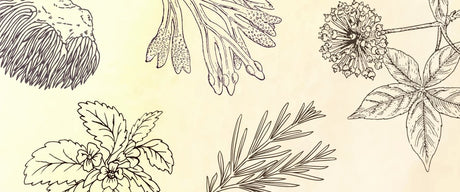Also known as “The Hiker’s Mushroom,” Turkey Tail may be one of the most easily and commonly found mushrooms on the planet. It thrives on dead hardwood trees and stumps, growing abundantly just steps away from your nearest hiking trail. Turkey Tail gets its name from the distinct multicolored rings it forms that resemble a turkey’s tail, and it is packed with functional benefits that support human health. Explore the history and benefits of this mushroom, along with how to add it to your routine in our guide to Turkey Tail.
Disclaimer: This blog is for educational purposes only and is not a substitute for medical advice. Please consult your health care practitioner before adding any new herbs to your wellness routine.
History of Use
The persistent and vigorous growth of Turkey Tail has been highly revered in Traditional Chinese Medicine (TCM) for thousands of years. It is thought to collect the yang energy of the trees and said to replenish the essence and qi (energy) in the body. Traditionally, Turkey Tail is used to invigorate the spleen, eliminate dampness and wind, relieve cough, help with breathing difficulty, and regulate the immune system.
Within the last 50 years, many large-scale clinical trials and peer reviewed studies have been done on Turkey Tail extracts. This mushroom is packed with triterpenes, and polyphenols, but most of the research has been focused on two of its powerful polysaccharides, PSK (polysaccharide krestin) and PSP (polysaccharide peptide) (1).
PSK and PSP have a number of benefits, but the most significant is their ability to boost immune cell production and enhance tumor infiltration. These compounds have also been shown to help protect the body from the side effects of radiotherapy, significantly extending survival rates in cancer treatment.
The success of Turkey Tail as an immuno-modulator and cancer medicine has made it the most heavily researched medicinal mushroom on the planet. Today, Turkey Tail extracts are the best-selling anti-cancer drug on the Japanese market and are used extensively throughout Asia, Europe, and North America.
The Benefits of Turkey Tail
Immune Health
Turkey Tail mushroom can support the body's recovery from low immune function and autoimmune conditions. Extracts can regenerate white blood cells and stimulate the activity and creation of T-cells, macrophages and natural killer cells. Turkey Tail has been shown to be anti-pathogenic and anti-viral for a variety of harmful organisms. It has been shown to be effective in assisting recovery from HIV, Herpes, HPV, and Hepatitis C, as well as a variety of other viral infections (2, 3, 4, 5).
Gut Microbiome Diversity
Research has shown that the fermentation of PSP by gut bacteria increases levels of beneficial bacteria – such as Bifidobacterium and Lactobacillus spp. – all while reducing less desirable bacteria (6). The benefits of polysaccharides for the human microbiome is an exciting area of research, as gut imbalances are the root cause of many chronic diseases of the 21st century. These polysaccharides calm down gut inflammation and support a healthy ecosystem for quality bacterial communities to thrive in (7).
Cancer Treatment
When it comes to cancer treatment, Turkey Tail is the medicinal mushroom of choice. With over 400 peer reviewed studies and clinical trials, Turkey Tail extracts have shown promising results when used both with and without conventional chemotherapy and radiation treatments. Cancers that have shown the most significant improvement include stomach, colorectal, liver, breast, uterine, esophagus, and lung (8, 9, 10). Turkey Tail extracts can also stimulate the regeneration of bone marrow and enhance immune recovery up to 400% when used in conjunction with radiation therapy (11).
Have Your Turkey Tail Your Way
Depending on lifestyle and personal preferences, you may choose to take your Turkey Tail in the form of a powder, capsule, or tincture.
Turkey Tail Mushroom Powder
Our water-soluble Mushroom Powders make it easy to add a potent dose of functional compounds to your morning coffee, smoothie, or other recipes. Made from 100% fruiting body mushrooms, our powders feature high extraction ratios to provide you with a concentration of bioavailable benefits.
Turkey Tail Mushroom Capsules
Our Mushroom Capsules offer a convenient twist on our best-selling Mushroom Powders. Our vegan and gluten-free Capsules are easy to add to your current supplement routine or take them with you on the go. Stick to your wellness routine, no matter what life throws at you with this form of mushroom support.
Turkey Tail Mushroom Tincture
Tinctures are a quick and effective way to add bioavailable mushroom extracts to your daily routine. They can be taken on their own or added to drinks and other recipes. Made with 100% fruiting body, our Mushroom Tinctures are formulated by Clinical Herbalists and handmade on Vancouver Island.
Ready to feel the benefits for yourself? Check out our Turkey Tail Mushroom Collection.





























